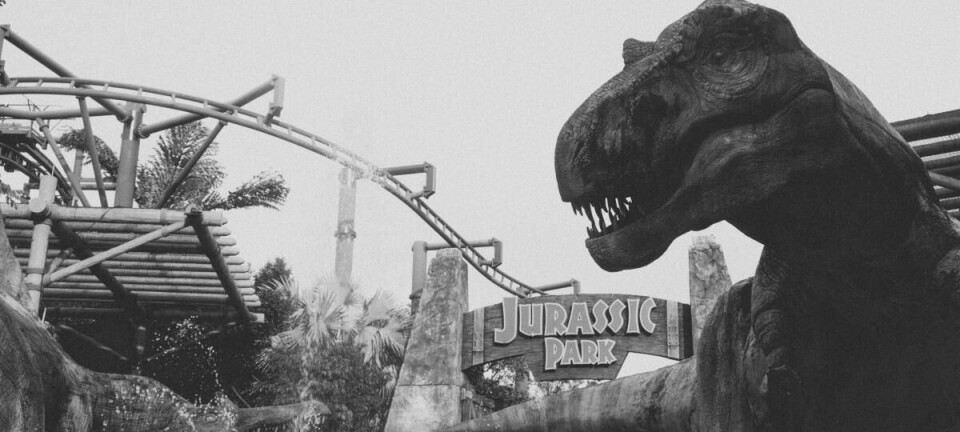article> Arts and Culture
“Were You There?”: A We Believe in Dinosaurs Review

Monica Long Ross and Clayton Brown's 2019 documentary 'We Believe in Dinosaurs' is a rather daunting moment of revelation that unveils the unpropitious now for the Americans.
by Dai-Ya Wang
Section Editor, Arts and Culture
"I have to be there to see this!" was my first thought when stumbling across We Believe in Dinosaurs on the Docville website. The name beckoned and I was hooked, partially due to how it reminds me that my knowledge in archaeological science is pretty much nonexistent and mainly because of the immediate conflict between Christianity and Science I spot in the film title itself. Born and raised in a non-religious household in Taiwan, I am continually fascinated by how religion, Christianity in particular, holds power over the decision making of a great majority of the American population. My curiosity is therefore an incentive powerful enough for me to try to convince you that this documentary is deserving of a visit to the movie theaters.
The three main interviewees in the documentary form an inciting antagonistic triangle that is an eye-opener on its own: between the diametric opposite of the creationist preacher Doug and the evolutionist archaeologist Dan stands David, a current evolutionist who frequently questions his previous faith in creationism. We may not be able to relate to the Kentuckian lifestyle and belief system. Yet, perhaps in David would we be able to find ourselves: for the past several decades of his life, David is stuck in the trial-and-error struggle of deciding whether to follow what seems right and what is right (that is, according to the Bible).
Unfortunately for David, this is no usual trial and error. Right between David’s past and present is the moral judge Ken Ham, founder and CEO of the Creation Museum, who reiterates the importance of creation and justifies the righteousness of finding answers in the Bible in his blog Answers in Genesis. “Were you there?" is Ken Ham's feisty go-to response to the so-called nonbelievers of creationism. It is challenging for the nonbelievers to comprehend the overwhelming impacts that Ken Ham has on his followers, whereas for those, such as David in his teenage years, Ken Ham’s words are life mottos.

I recall facing a moral dilemma similar to David's. I remember attending one of the so-called “testaments” in the Fo Guang Shan Buddha Museum in Kaohsiung, Taiwan during my undergraduate years because one close relative is a pious Buddhist. The testaments' speakers would take turns and share their experiences of reviving their failed careers thanks to their unshakable faith in Buddhism and how they turned to it for spiritual awakening in times of need. Surprisingly, these testaments' objective is not to persuade the nonbelievers to conform to Buddhism but to sustain a progressing image of the almighty Buddha in different periods. At one point, one of the speakers did ask his audience, "Who do we turn to when we feel entirely distressed?" In return, everyone in the audience except me stood up and chanted altogether, "Buddha!".
I remember sitting in my seat, in awe, because a part of me failed to fathom if what I had just experienced bore any cultish connotation. Consequent to the Buddhist "testaments," I resort to the opinion that any form of religion has the potential to fall back on near cultish propaganda if the philosophy is taken out of context by the manic followers.
On the many faces of the human dioramas that strive to depict life outside of Noah's ark, we see a distorted version of human life that vulgarizes the diverse humanity. This false depiction denies people of the possibility to see beyond religion, to see a more incredible picture that extends beyond human imagination. But then again, what are all these answers about, and why do we need them? Is it, in actuality, either paradiso or hell and damnation if we choose to go against what we were brought up with? Thankfully for the audience, We Believe in Dinosaursis neutral. It does not aim to favor any side in the conflict, nor does it attempt to persuade its audience to believe that science is the truth.
Trailer to We Believe in Dinosaurs:
For more regular content
- Follow us on Facebook: https://www.facebook.com/thevoice.loko
- Check out our Instagram page: https://www.instagram.com/thevoice.kuleuven/
- Listen to our podcasts on: https://www.mixcloud.com/The_Voice_KUL_Student_Radio/
For submissions or applications
- Email us at thevoice@loko.be
- Or message us on Facebook





